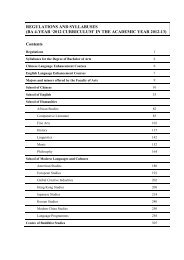Bachelor of Arts (BA) - The University of Hong Kong
Bachelor of Arts (BA) - The University of Hong Kong
Bachelor of Arts (BA) - The University of Hong Kong
You also want an ePaper? Increase the reach of your titles
YUMPU automatically turns print PDFs into web optimized ePapers that Google loves.
187GEOG2057.Leisure and recreation in modern society (6 credits)(This course is also <strong>of</strong>fered to second and third year non-<strong>BA</strong> students for inter-Faculty broadeningpurposes.)This course is an overview <strong>of</strong> the broad field <strong>of</strong> recreation and leisure, emphasizing the understanding<strong>of</strong> various leisure phenomena. As such, it provides the students with an introductory understanding <strong>of</strong>the nature and scope <strong>of</strong> leisure, leisure behaviour and affiliated recreation activity. It also reviewsrelationships between leisure and space, place, time, play, work, family, education, ethnicity, gender,and environment.Assessment: 40% coursework, 60% examination.This course will be <strong>of</strong>fered in the first semester.GEOG2059.Geography <strong>of</strong> information technology (6 credits)(This course is also <strong>of</strong>fered to second and third year non-<strong>BA</strong> students for inter-Faculty broadeningpurposes.)This course is about the spatial implications <strong>of</strong> 'convergent information technology' (IT), broadlydefined as computers and telecommunications. It begins by exploring the historical roots andgeographical spread <strong>of</strong> IT throughout the world since the introduction <strong>of</strong> the Internet in the 1970s. <strong>The</strong>course proceeds to examine IT as spatial systems. <strong>The</strong> geographical concept <strong>of</strong> 'innovation milieu' isintroduced as the theoretical framework for analyzing the experiences <strong>of</strong> the Silicon Valley and Japan'stechnopolis programme. Students are also exposed to the important concepts <strong>of</strong> the 'information cities','electronic highways' and 'wired cities'. <strong>The</strong> ways in which all these theories and concepts can beapplied in the future IT development <strong>of</strong> <strong>Hong</strong> <strong>Kong</strong> are examined.Assessment: 100% coursework.This course will be <strong>of</strong>fered in the second semester.GEOG2060.An introduction to archaeology (6 credits)(This course is also <strong>of</strong>fered to second and third year non-<strong>BA</strong> students for inter-Faculty broadeningpurposes.)How do you know where you are going until you know where you have been? This course willintroduce students to the role archaeology has played in the construction <strong>of</strong> humanity's history andprehistory. It is intended to be a broad survey <strong>of</strong> the discipline, its discoveries, scientific and analyticaltools and applications. <strong>The</strong> course will assist students in recognising new cultural dimension within thelandscape around them and provide a sound basis for further study here or abroad.Assessment: 40% coursework, 60% examination.This course will be <strong>of</strong>fered in the first semester.GEOG2061.Cultural heritage management and tourism (6 credits)(This course is also <strong>of</strong>fered to second and third year non-<strong>BA</strong> students for inter-Faculty broadeningpurposes.)Understanding the relationship between cultural heritage management and tourism is important forplanning and managing tangible cultural heritage in a sustainable manner. <strong>The</strong> course examines theunderlying principles, goals and concepts that drive current cultural heritage management and tourismactivity around the world. It will provide students with a framework for analysing the complementaryand competing demands made by conservation and tourism <strong>of</strong> tangible cultural heritage. How suchdemands arise during the planning and development <strong>of</strong> a heritage attraction will be discussedthroughout the course using examples from five continents.Assessment: 40% coursework, 60% examination.This course will be <strong>of</strong>fered in the second semester.
















